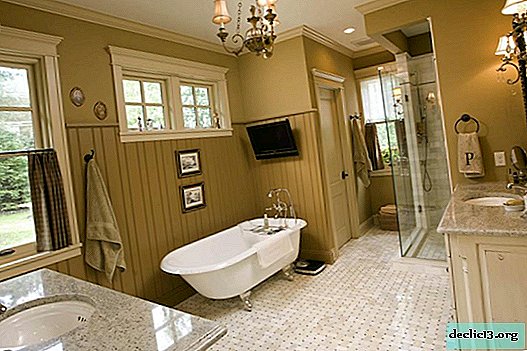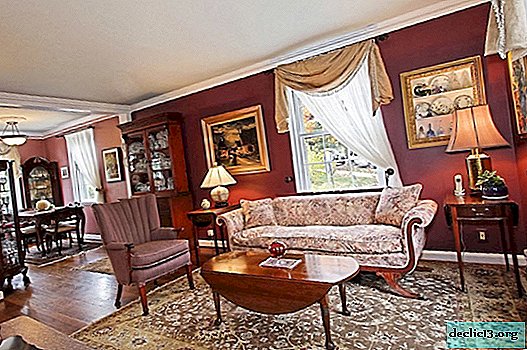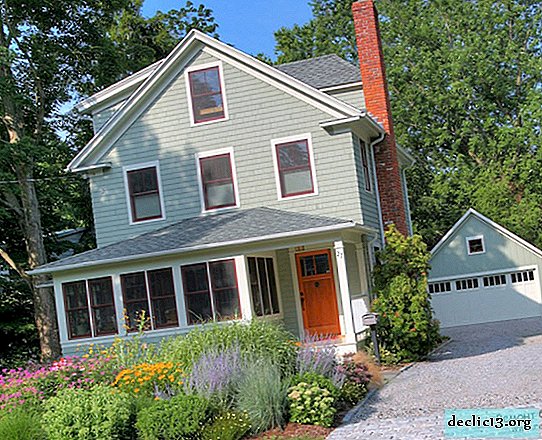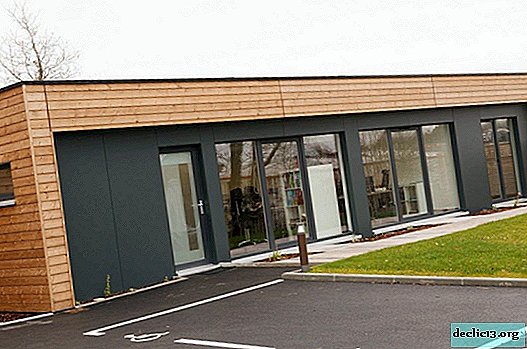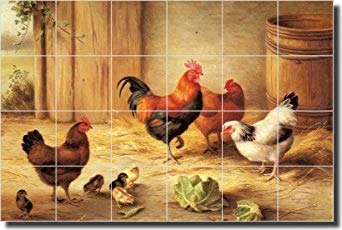Methods of decorating furniture, how to do it yourself
It is not always possible to purchase new furniture, because new interior items are expensive. In such cases, you can independently transform the old cabinets, chests of drawers and other products. In addition, decorating furniture with your own hands will avoid unnecessary financial costs and decorate the room with original models.
Training
Before you start decorating furniture, you need to prepare the surface of the product. Depending on the type of jewelry, the preparation is different. Most often, for this stage, you need:
- putty for leveling surfaces;
- primer for filling cracks and cracks;
- various dyes to update the color of furniture;
- varnish for topcoat. It is used in order to protect the decorative elements of furniture from external influences and extend their service life;
- special pastes to make the surface polished.
Also, sandpaper and decorative brushes are needed for preparation. In addition, plastic plugs made of pvc for furniture will help hide surface imperfections. A round plug can hide a small dent, and it will also decorate products. Their main task is to protect the fasteners of interior items. Once the surface is ready, you can start decorating furniture.
 Primer
Primer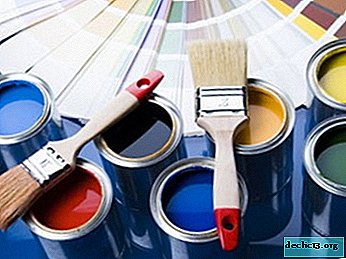 Paint
Paint Lacquer
Lacquer Putty
PuttyStages of work taking into account technology
There are many ways to decorate furniture with your own hands. To do this, use fabric, self-adhesive strips, paint, self-adhesive decorative moldings, napkins, chrome pipes, newspapers, decorative profiles and other improvised materials.
Wallpaper
You can use wallpaper for your own furniture decor. The advantages of this method are obvious:
- it does not require large expenses, a small amount of material will be needed for decoration, most likely, one roll will be enough. In addition, in almost every house you can find old pieces of wallpaper left over from the last repair;
- You can glue the interior items without the help of specialists.
Wallpapering is recommended with wallpaper glue. If the products are often used, it is recommended to choose a vinyl wallpaper. They are denser and can be cleaned in case of contamination. It is better to varnish paper canvases to protect them from various stains. Please note that after varnishing the wallpaper will become a couple of tones darker.
Wallpaper decor is different. Some cover the entire surface of cabinets, chests of drawers, others prefer to decorate only certain parts of it. An original way - to issue a back wall of racks, cases. These elements are rarely given due attention, they look standard and boring. The rack divided into sections can be decorated with different wallpapers. You can also arrange the interior space of the cabinet. It is recommended to select wallpapers with drawings and various patterns, so the furniture will turn out unusual and will decorate any home.
 Materials and Tools
Materials and Tools
 Pour decoupage glue into the cup and work through the surface
Pour decoupage glue into the cup and work through the surface Apply a layer of glue to the back of the wallpaper
Apply a layer of glue to the back of the wallpaper The furniture decoupage technique itself consists in carefully distributing paper over the surface using a soft roller.
The furniture decoupage technique itself consists in carefully distributing paper over the surface using a soft roller. After about half an hour we take sandpaper and carefully process the edges, cutting off excess
After about half an hour we take sandpaper and carefully process the edges, cutting off excess We grind the edges of the table a little and apply the final protective layer of varnish
We grind the edges of the table a little and apply the final protective layer of varnish
Decoupage
Decorative and applied art in the form of decoupage has the following positive aspects:
- with it, you can create exclusive interior items;
- the cost of furniture stickers is minimal;
- You can decorate any furniture elements made of wood, metal, glass, plastic.
In specialized stores you can buy ready-made decoupage kits. You can just as well use the means at hand. For this, newspapers, magazines, old books are suitable.
The most popular are decorative napkins. Do-it-yourself furniture decoration with the help of such napkins is done in two ways: classic and reverse.
The classic method is to stick a picture on the front side of the furniture:
- crop the image along the contours;
- prepare a sticker or decorative napkins;
- stick them on the surface of the product using special glue for decoupage. PVA glue will also cope well with the task;
- then gently smooth the picture with a roller;
- if excess glue comes out from under the sticker or napkin, it must be removed with a cloth;
- the final stage is the application of varnish. This should be done only after the drawing dries well.
Reverse decoupage is the gluing of napkins or other elements onto a transparent surface from the back. The principle of action is exactly the same as with the classical method.





Aging
Aged dressers, tables, cabinets look vintage. They have some special chic, fit perfectly into the interior in a country style, Provence. To artificially age furniture, you need to know some features.
Aging furniture involves the use of soft wood or medium hard materials. The most suitable products from:
- larch trees;
- ate;
- pine trees.
For aging interior items use different furniture decoration techniques:
- stain treatment - in this method, part of the stain is removed after painting. Paint products in such a way that the protrusions are light and the depressions are dark. At the final stage, the surface is covered with antique wax;
- painting - the effect of scuffing is achieved by painting the surfaces with two paints. One of them is more saturated shade. After painting, the product is treated with sandpaper. Due to this, a darker color appears, a multilayered effect is obtained;
- lime - lime effect is created, and the products seem old, worn;
- gilding - is also used to give products an antique look. The method is quite simple and fast;
- aging - when it surfaces are treated with special chemical compounds. Only solid types of wood are used. Olding achieves the effect of burnout, fading, moss;
- craquelure.

 Brushing
Brushing
 Wood after processing
Wood after processing Corners and edges are processed with sandpaper.
Corners and edges are processed with sandpaper.
 Stain coating
Stain coating Wood after drying
Wood after drying Primer
Primer Priming
Priming Coloring materials
Coloring materials Paint application
Paint application Painted tree
Painted treeCloth
As decorative elements for furniture, different types of fabric are used:
- curtains;
- furniture upholstery;
- tablecloths;
- pillows;
- bedspreads.
Such an overhead decor for furniture is used as a decorative finish for different types of furniture: chests of drawers, cabinets, cabinets. It is possible to use fabric, such a DIY furniture decor, the photo of which is presented in the selection, is made as follows:
- first carefully prepare the surface of the furniture;
- then cut the fabric lining for the furniture of the desired size. Do not forget to leave a few centimeters for bends and allowances;
- Coat all sections with PVA glue. Leave on for 40 minutes;
- apply glue to the surface of the products. The glue should be distributed in an even thin layer. If there will be a lot of it, it will seep on the front side of the fabric and spoil the entire decor;
- lay decorative covers on furniture made of fabric on the surface and gently rub with your hand;
- carefully glue the edges and corners;
- to make it beautiful, cut off the excess fabric at the corners or stitch it with a file.
Fabric overlay is a simple and inexpensive way to transform furniture. Decorative strips for furniture made of fabric will make products unusual and interesting. As an additional decoration, you can use buttons, decorative cord, beads.




Craquelure
Craquelure was originally used for the restoration of various types of furniture. Subsequently, this method was used for the artificial aging of dressers, tables, benches, cabinets and other products. The craquelure technique is also used to decorate vases, paintings, caskets.
Today, a lot of tools are being produced for applying cracks on different types of surfaces. You can age wooden, metal, plastic furniture. Means are one and two-component. If there is no specific experience in restoration, it is recommended to watch a video or a master class on this topic. You can also purchase ready-made kits for creativity.
The process is as follows:
- first the surface is primed with metallic paint;
- after drying, cover with craquelure varnish;
- the next is a layer of matte paint;
- with a synthetic bristle brush, the paint is still wet on the surface. Thus, the effect of cracks is achieved.
In some cases, "cracks" begin to appear with the interaction of matte paint and varnish. Then brushing is not necessary, especially if there is no experience in such matters. Inaccurate brush movements can only spoil the desired effect.




Using stencils
Furniture stencils are one of many ways to decorate them. In addition, they can be used to create decorative glass for furniture. Templates can be purchased in stores or do it yourself.
When working with stencils, it is better to choose thick paint. Apply it carefully with a roller. You can remove the stencil only when the paint dries. Otherwise, you can spoil or smear the picture.
Stencils can be found in the selection and print the one you like. Then cut and start decorating. Paper tape will help fix patterns to the surface of products.
The subject matter of the images is diverse and differs depending on the room where the furniture will be located. For example, for children often use images of animals, toys. In the living room, floral and abstract motifs will be appropriate.
To create a final image, use decorative molding. They make out the facades of furniture, the head of the beds. Self-adhesive decorative polyurethane profile is easy to use and install. The decor from polyurethane is harmless, it is created from environmentally friendly materials.
In addition, pulp decor is often used. Pulp is a finished part of various forms for decorating furniture. An original way to restore furniture is to use a tool such as silicone decorative plaster. The wall can be decorated with the same plaster. So the room will seem whole. Decorative furniture lattice will decorate the facades of cabinets, chests of drawers where ventilation is needed.





